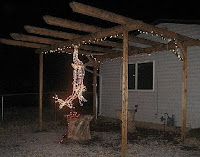celebrate labor
"The superior person understands rightness; the inferior person understands profit. -- Confucius "
Today is Labor Day. When I was growing up, I saw this as a "union" holiday, largely because my mom and all her radical friends would parade with slogans like, "We all stand together or we all fall separately." I was never a big union supporter, although one of my first paying jobs was walking the picket line in front of the D&A Superstore in Kenai when the teamsters went on strike against Alaska Cold Storage. (at least I think that was the scenario, all I know is I walked back and forth with a sign and got $10/hour!).
When I started work for the state of Alaska, I was required to be in the Alaska State Employees Association. I wasn't very happy about having to pay my hard earned cash to a union that I didn't perceive any benefit from. I remember getting one of my first ASEA newsletters, correcting all the grammatical errors with a bright red pen, and mailing it back.
I remember asking my mom why she liked the darn union so much, and what made her a believer. She told me a story about being a secretary in a K- 2 elementary school and only having a school nurse part of each week. At the time it seemed to me ridiculous that someone should have to organize or join a union in order to have common sense prevail. Later, when I was attending UAF, I drove my mom out to Delta Junction where she was speaking to a group of support employees who were considering organizing with NEA-AK. There are two things I remember from the trip: one is that is snowed in September, and the other was that whatever my mom was saying, she was passionate in her belief.
When I started teaching, I didn't have any intention of joining the teacher's union. As luck would have it however, the NEA-AK president had set up a booth at our district inservice and hooked me into conversation. When she found out who my mom was, I was stuck. If I was ever planning to go home, I needed to join; so I did. Later that first year I started hearing stories about bad things that had happened to teachers who got crossways with administrators. Teachers could end up transferred to remote villages with poor living conditions, or simply moved from their nice housing to worse housing so the principal could have his girlfriend closer to his place. We went an entire semester without a copy machine in our school, while the school board met in Anchorage and places like Las Vegas. I ended up being the vice president, and on the (so-called) bargaining team, simply because lots of folks were afraid.
I started attending the annual business meeting of NEA-AK and heard stories that made me realize that organized labor was important. I also saw the personal and professional development that the union offered. I met incredibly smart, capable, passionate, and capable women who all credited the union with their growth. Even now so many of the women I admire were leaders and workers in NEA. I told myself that NEA-AK was different than other unions, that it was a "professional organization" not a strong arm political organization. I still had a sort of negative view of unions in general.
Since I've gotten more settled in Fairbanks, and experienced the changing political climates in both my community and state, I've come to view unions differently. Looking back at the history of labor and trade unions, Beverly Hernandez observes that, "The idea of organizing workers according to their trades spread around the country. Factory workers, dock workers and toolmakers all began to demand and get their rights to an eight-hour workday, a secure job and a future in their trades." These same ideas and rights are at risk in today's America, where fear of an economic crisis makes workers grateful to have any job at all, and employers feel they can do whatever they want to cut costs. In Alaska, teachers unions, electrical workers, teamsters and peace officers have all joined together to elect candidates who will protect retirement benefits, local hire, common sense.
There's talk that in this global economy, labor unions have seen their heyday. Still, leaders who I respect credit the importance of labor. Jimmy Carter said, "Every advance in this half-century: Social Security, civil rights, Medicare, aid to education... one after another- came with the support and leadership of American Labor."

Comments